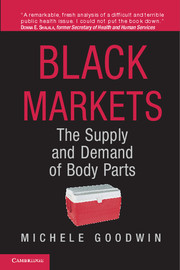Book contents
- Frontmatter
- Dedication
- Epigraph
- Contents
- Miscellaneous Frontmatter
- Preface
- Acknowledgments
- BLACK MARKETS
- PART ONE UNDERSTANDING THE STRAIN ON ALTRUISM
- PART TWO LEGAL FRAMEWORKS AND ALTERNATIVES
- 5 The Uniform Anatomical Gift Act
- 6 Presumed Consent: The Unsuspecting Donor
- 7 Commoditization: Incentives for Cadaveric Organ Harvesting
- 8 Black Markets: The Supply of Body Parts
- PART THREE CRITIQUING THE SLAVERY AND BLACK BODY MARKET COMPARISON
- Notes
- Bibliography
- Index
8 - Black Markets: The Supply of Body Parts
from PART TWO - LEGAL FRAMEWORKS AND ALTERNATIVES
Published online by Cambridge University Press: 14 September 2019
- Frontmatter
- Dedication
- Epigraph
- Contents
- Miscellaneous Frontmatter
- Preface
- Acknowledgments
- BLACK MARKETS
- PART ONE UNDERSTANDING THE STRAIN ON ALTRUISM
- PART TWO LEGAL FRAMEWORKS AND ALTERNATIVES
- 5 The Uniform Anatomical Gift Act
- 6 Presumed Consent: The Unsuspecting Donor
- 7 Commoditization: Incentives for Cadaveric Organ Harvesting
- 8 Black Markets: The Supply of Body Parts
- PART THREE CRITIQUING THE SLAVERY AND BLACK BODY MARKET COMPARISON
- Notes
- Bibliography
- Index
Summary
We in the United States cannot claim any high moral ground, given the number of U.S. transplant centers, public and private, with the idea of donated organs as a national and community resource. Dr.Michael Friedlander, chief nephrologist at Hadassah Hospital in Jerusalem, tired of reports about commercialization of kidneys in Israel, decided like Dr.Diflo, to speak out, and he says that among his recovering international transplant patients are several Israelis who have recently returned this year and last from the United States with kidneys purchased here from living donors.
INTRODUCTION
Another method to address organ demand is to simply allow underground systems to independently flourish. This would ultimately be where we are now; altruistic procurement coexists with private, unregulated, or loosely regulated tissue and organ supply. Organ traffickers and the transplant tourism industry are secondary players in our national transplantation system. These players fill in the gaps of our procurement system, but are they safe alternatives? Unregulated, private organ procurement subsystems pose serious problems that extend far beyond our moral criticisms. These problems include an inability to properly monitor public health, which is not an individual problem. We learned from recent experiences with Severe Acute Respiratory Syndrome (SARS) how quickly a local health crisis can reach international epidemic proportions in a very short period. In a matter of weeks, populations were quarantined on three continents after the SARS outbreak.
Recent reports indicate rabies and other contagious diseases such as West Nile Virus spreading through organ transplants. Those were cases from the United States, which were easier to trace because they were in the public record, with data monitored by the Centers for Disease Control and Prevention (CDC).However, the CDC lacks monitoring capacity with underground transplantations in third-world countries. In addition, the role of physicians is complicated by these transplants; does a physician expose himself to liability for failure to treat a patient who obtained an organ abroad? If the physician provides postoperative care for her patient, does she expose herself to discipline from the hospital where she serves or federal penalties?
Our indifference to alternative solutions drives individuals to create procurement subsystems that operate in the shadows of law. This is the de facto mode of organ procurement; altruism mixed with black market transactions. These transactions are best categorized as Pareto inferior; that is, there is always one party that is worse off.
- Type
- Chapter
- Information
- Black MarketsThe Supply and Demand of Body Parts, pp. 169 - 190Publisher: Cambridge University PressPrint publication year: 2006



